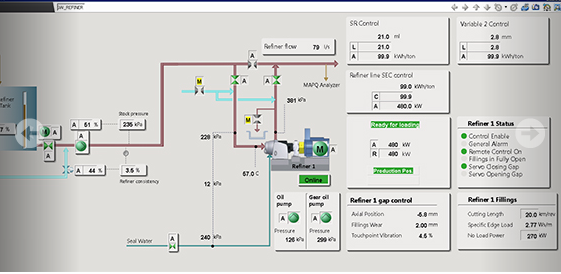 Valmet introduces the Valmet Fiber Furnish Control application package for board and papermakers to stabilize refiner operation for maximized production efficiency with ensured furnish quality. Based on real time measurements of multiple fiber properties and freeness, the control features advanced feedback and feedforward solutions together with model predictive control.
Valmet introduces the Valmet Fiber Furnish Control application package for board and papermakers to stabilize refiner operation for maximized production efficiency with ensured furnish quality. Based on real time measurements of multiple fiber properties and freeness, the control features advanced feedback and feedforward solutions together with model predictive control.
The Valmet Fiber Furnish Control application can be fully integrated into an existing Valmet DNA Automation System or Valmet IQ Quality Control System. The solution is also available as a stand-alone version including all necessary basic licenses and hardware if required.
Demonstrated results
In the development phase, the control performance of the Valmet Fiber Furnish Control was followed closely for 18 months at a mill in Finland, where the solution ensured that stock production and quality targets were met from two fiber lines, while providing energy savings. In the fiber refining lines, freeness variability was reduced by 30% to almost 70% compared to the time before the control was introduced.
“In the one and a half years since the project started, the reduction in web breaks due to the more homogenous fiber furnish resulted of several extra days of production. The best thing was the positive feedback from the operators on how they were able to focus more on controlling the machine when making grade changes,” says Ismo Joensuu, Manager, Board & Paper Analyzers, Automation business line, Valmet.
Key fiber properties taken into account
Typically, refiner controls have been based on specific energy or freeness targets where key fiber properties such as fiber length, fines, shives and fibrillation are followed. Valmet Fiber Furnish Control can be connected to a Valmet Fiber Furnish Analyzer, which continuously measures these properties in adjusting the specific energy setpoint for target freeness. Another key element of the control are Valmet’s consistency measurements which provide reliable and accurate measurements essential for the stabilizing control functions.































































































